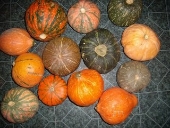posted 4 years ago
To me a landrace is just another way of saying a cultivar. Alot of cultivars actually state the land they come from such as, Florida King, or Chicargo Hardy, Desert Queen. The good news is that you don't need a PhD, neither do you need to get a patent have your own cultivar.
I wouldn't call the 1st generation F1hybrids or even the 4th generation a landrace but by the 7th generation it will be stable and I would call it a stabilized landrace/cultivar. So you might be wondering what would make your landrace-cultivar different from a commercial cultivar. They usual select for uniform looks and ripening time, and how well it works with artificial fertilizer. But you could select for how well in survive with your rainfall or pest or high calcium soil, or bitter/sweet taste preference, or maybe you only want to save fruits/pods that are purple vs yellow, or maybe it is one that ripens over 60days vs just in a tight 7day window.
You don't have to limit a landrace to just plants. You could make your own chicken cultivar too, selecting for how well they forage, lay eggs/put on meat, survive predators, survive the winter with no heat/etc. This is would pretty much work for any animal.
Iterations are fine, we don't have to be perfect
My 2nd Location:Florida HardinessZone:10 AHS:10 GDD:8500 Rainfall:2in/mth winter, 8in/mth summer, Soil:Sand pH8 Flat







